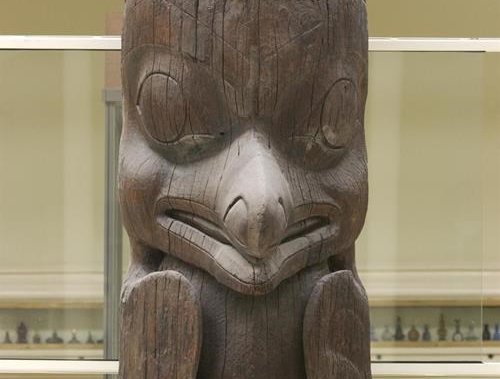Nisga’a Nation Chief Earl Stephens says he shook with emotion when he saw for the first time a memorial totem pole with deep ties to his family and spiritual significance to the Indigenous people of British Columbia’s Nass Valley on display at Scotland’s National Museum.
He touched the red cedar pole and spoke to it in the Nisga’a language as officials from the national museum quietly observed, said Stephens.
The chief said he was celebrating Thursday after the museum’s board of trustees agreed to transfer the 11-metre memorial totem pole, which has been on display at the Edinburgh institution since 1930, back to Nisga’a territory.
“The pole is part of a living being,” Stephens said in an interview from the Nisga’a village of Laxgalts’ap.
It carries the spirit of his great, great grandmother, which is why it’s so important to bring it back to the Nisga’a lands where it came from, he said.
The museum said its board of trustees approved the First Nation’s request to transfer the pole back to its home in northwestern B.C.
Read more:
Some African artifacts returned home but advocates push for more
Read More
-
Some African artifacts returned home but advocates push for more
A delegation of Nisga’a leaders travelled to Edinburgh last August to ask that the memorial pole be returned to their territory.
Stephens said the Nisga’a people believe the hand-carved pole is alive with the spirit of his ancestor and it’s now coming home to rest.
He said it means a great deal to have the Ni’isjoohl memorial pole returned to the Nisga’a lands, so family, nation and future generations can connect with the living history.
“Being able to stand there and touch it and talk in our own language, it was really, really moving,” said Stephens. “They saw and heard me and they saw how I felt.”
The memorial pole was taken without consent in 1929 by an ethnographer researching Nisga’a village life, who then sold it to the Scottish museum where it has been on display since 1930.
A museum statement says it was carved from red cedar in 1855 in memorial of Ts’aawit, a Nisga’a chief.
The pole includes a series of interlocking figures relating to the chief’s family history through his ancestors, family crests and his clan, says the museum. It originally stood in front of the home of the chief’s relatives located near B.C.’s Nass River and is currently on display in the Living Lands gallery at the National Museum of Scotland, it says.
Read more:
Indigenous groups plead for return of Vatican artifacts amid Pope Francis Canada trip
The museum’s decision to bring the memorial totem back to its home adds to the ongoing story of the history of the Nisga’a Nation, said Dr. Amy Parent, Canada Research Chair in Indigenous education and governance.
“Our hearts have been moved with the commitment to return our family’s cultural treasure, which enables us to create a new story to re-right a colonial wrong with the honour, dignity and solidarity of the Scottish peoples who are walking beside us on our decolonizing journeys,” she said in a statement.
The repatriation of the Nisga’a memorial totem pole is a historic moment for the Nisga’a and other Indigenous Peoples, Parent said in an interview.
“We really hope that our story inspires our Indigenous relatives around the world to know that the impossible is possible when challenging colonial structures for the repatriation of our stolen cultural treasures and that justice for ancestors will prevail,” she said.
The museum said it will begin planning the safe removal of the totem from its display location and prepare it for transport to B.C.
“We are pleased to have reached this agreement and to be able to transfer the memorial pole to its people and to the place where its spiritual significance is most keenly understood,” said Chris Breward, the director of National Museums Scotland, in a statement. “We hope this is not the end of the process but the next step in a fruitful and ongoing relationship with the Nisga’a.”
The decision to transfer the memorial totem back to the Nisga’a Nation required and received the approval of the Scottish government, said Ian Russell, board chairman of the trustees of National Museums Scotland.
© 2022 The Canadian Press
For all the latest World News Click Here
For the latest news and updates, follow us on Google News.

